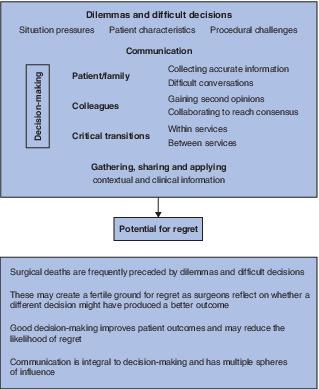当前位置:
X-MOL 学术
›
Br. J. Surg.
›
论文详情
Our official English website, www.x-mol.net, welcomes your
feedback! (Note: you will need to create a separate account there.)
Learning from regret.
British Journal of Surgery ( IF 8.6 ) Pub Date : 2020-02-20 , DOI: 10.1002/bjs.11452 F M Boyle 1 , J Allen 2 , T Rey-Conde 2 , J B North 2
British Journal of Surgery ( IF 8.6 ) Pub Date : 2020-02-20 , DOI: 10.1002/bjs.11452 F M Boyle 1 , J Allen 2 , T Rey-Conde 2 , J B North 2
Affiliation

|
BACKGROUND
Death after surgery is infrequent but can be devastating for the surgeon. Surgeons may experience intense emotional reactions after a patient's death, reflecting on their part in the death and the patient's loss of life. Excessive rumination or feelings of regret may have lasting negative consequences, but these reactions may also facilitate learning for future decision-making. This qualitative study analysed surgeons' reflections on what might have been done differently before a patient's death and explored non-technical (cognitive and interpersonal) aspects of care as potential targets for improvement.
METHODS
In Australia's Queensland Audit of Surgical Mortality, surgeons reflect on factors surrounding the death of patients in their care and respond to the open-ended question: in retrospect, would you have done anything differently? Framework analysis was applied to surgeons' responses to identify themes relating to non-technical aspects of care.
RESULTS
Responses from 1214 surgeons were analysed. Two main themes were identified. Dilemmas and difficult decisions confirmed the uncertainty, complexity and situational pressures that often precede a surgical death; regret and empathy for patients featured in some responses. In the second main theme, communication matters, surgeons cited better communication, with patients, families, colleagues and at handover, as a source of reflective change to improve decision-making and reduce regret.
CONCLUSION
Surgical decision-making involves uncertainty, and regret may occur after a patient's death. Enhancing the quality of communication with patients and peers in comprehensive assessment of the surgical patient may mitigate postdecision regret among surgeons.
中文翻译:

从遗憾中学习。
背景技术手术后的死亡很少见,但是对于外科医生来说可能是毁灭性的。在患者死亡后,外科医生可能会经历强烈的情绪反应,这反映了他们在死亡和患者丧生中所起的作用。过度的沉思或后悔的感觉可能会带来持久的负面影响,但是这些反应也可能有助于学习,以便将来做出决策。这项定性研究分析了外科医生对患者死亡之前可能采取的不同措施的思考,并探讨了非技术(认知和人际)护理方面的潜在改进目标。方法在澳大利亚昆士兰州外科手术死亡率审计中,外科医生对患者护理中死亡的相关因素进行了反思,并回答了开放式问题:回顾过去,您会做其他不同的事情吗?将框架分析应用于外科医生的反应,以识别与护理非技术方面有关的主题。结果分析了1214位外科医生的反应。确定了两个主要主题。困境和艰难的决定证实了手术死亡之前的不确定性,复杂性和处境压力。对某些回应中的患者表示遗憾和同情。在第二个主要主题中,交流很重要,外科医生认为与患者,家属,同事和移交时更好的交流是反思性改变的来源,以改善决策并减少后悔。结论手术决策涉及不确定性,患者死亡后可能会后悔。
更新日期:2020-02-20
中文翻译:

从遗憾中学习。
背景技术手术后的死亡很少见,但是对于外科医生来说可能是毁灭性的。在患者死亡后,外科医生可能会经历强烈的情绪反应,这反映了他们在死亡和患者丧生中所起的作用。过度的沉思或后悔的感觉可能会带来持久的负面影响,但是这些反应也可能有助于学习,以便将来做出决策。这项定性研究分析了外科医生对患者死亡之前可能采取的不同措施的思考,并探讨了非技术(认知和人际)护理方面的潜在改进目标。方法在澳大利亚昆士兰州外科手术死亡率审计中,外科医生对患者护理中死亡的相关因素进行了反思,并回答了开放式问题:回顾过去,您会做其他不同的事情吗?将框架分析应用于外科医生的反应,以识别与护理非技术方面有关的主题。结果分析了1214位外科医生的反应。确定了两个主要主题。困境和艰难的决定证实了手术死亡之前的不确定性,复杂性和处境压力。对某些回应中的患者表示遗憾和同情。在第二个主要主题中,交流很重要,外科医生认为与患者,家属,同事和移交时更好的交流是反思性改变的来源,以改善决策并减少后悔。结论手术决策涉及不确定性,患者死亡后可能会后悔。









































 京公网安备 11010802027423号
京公网安备 11010802027423号